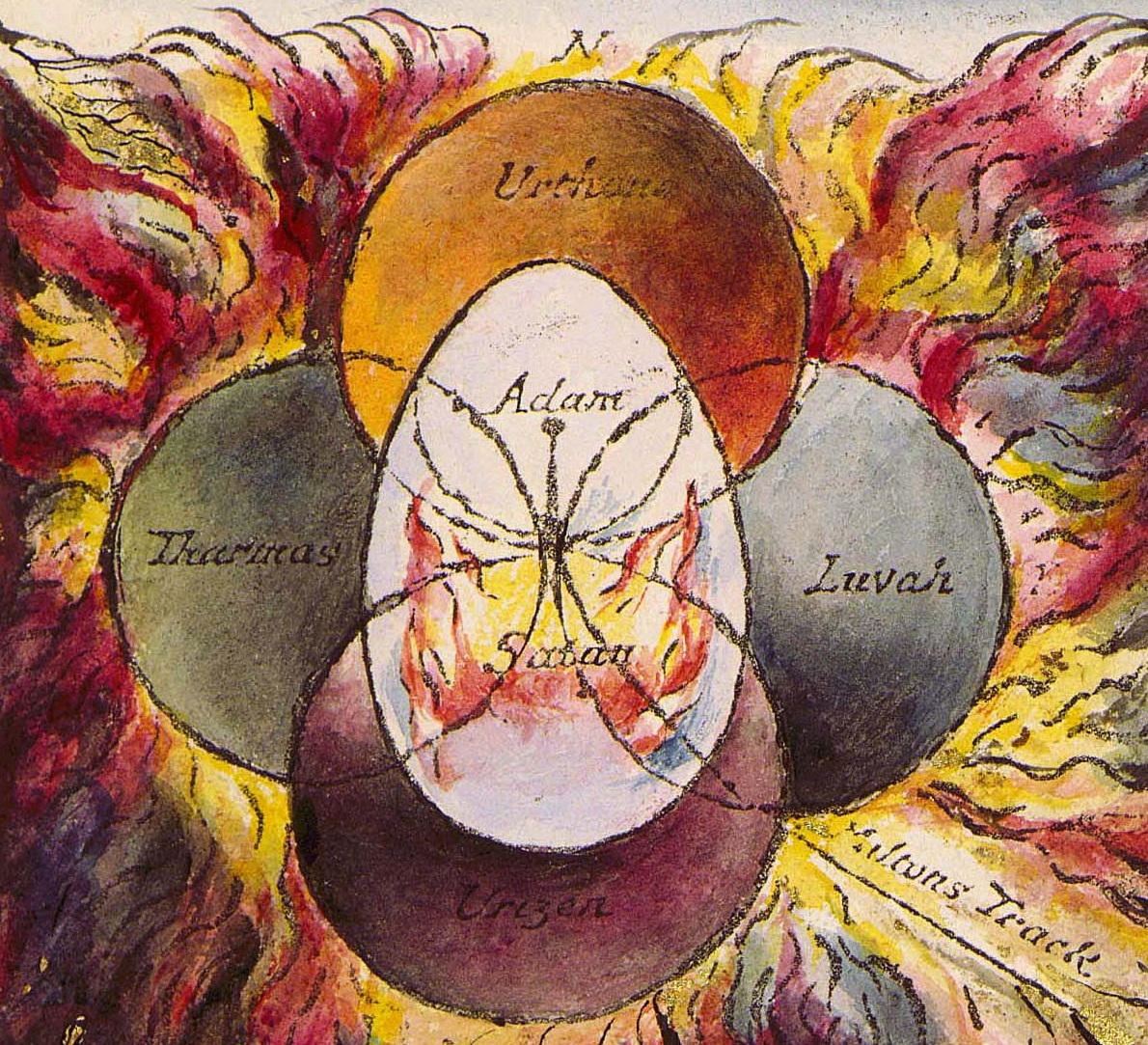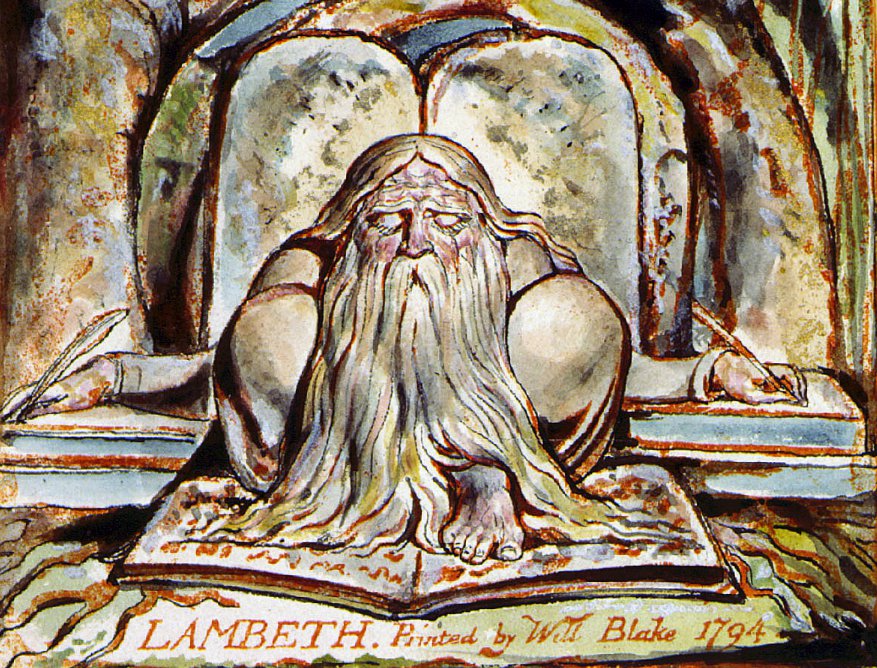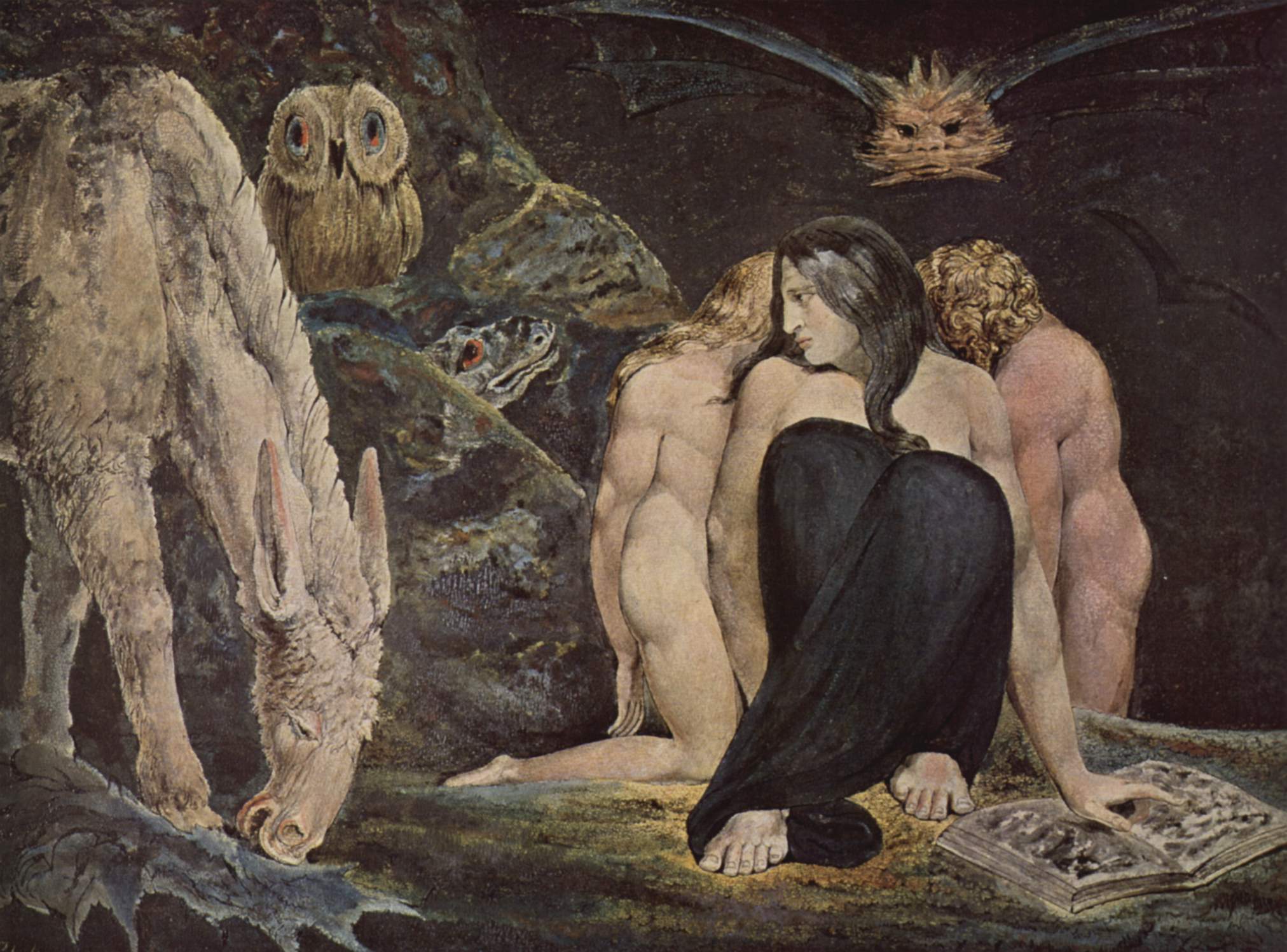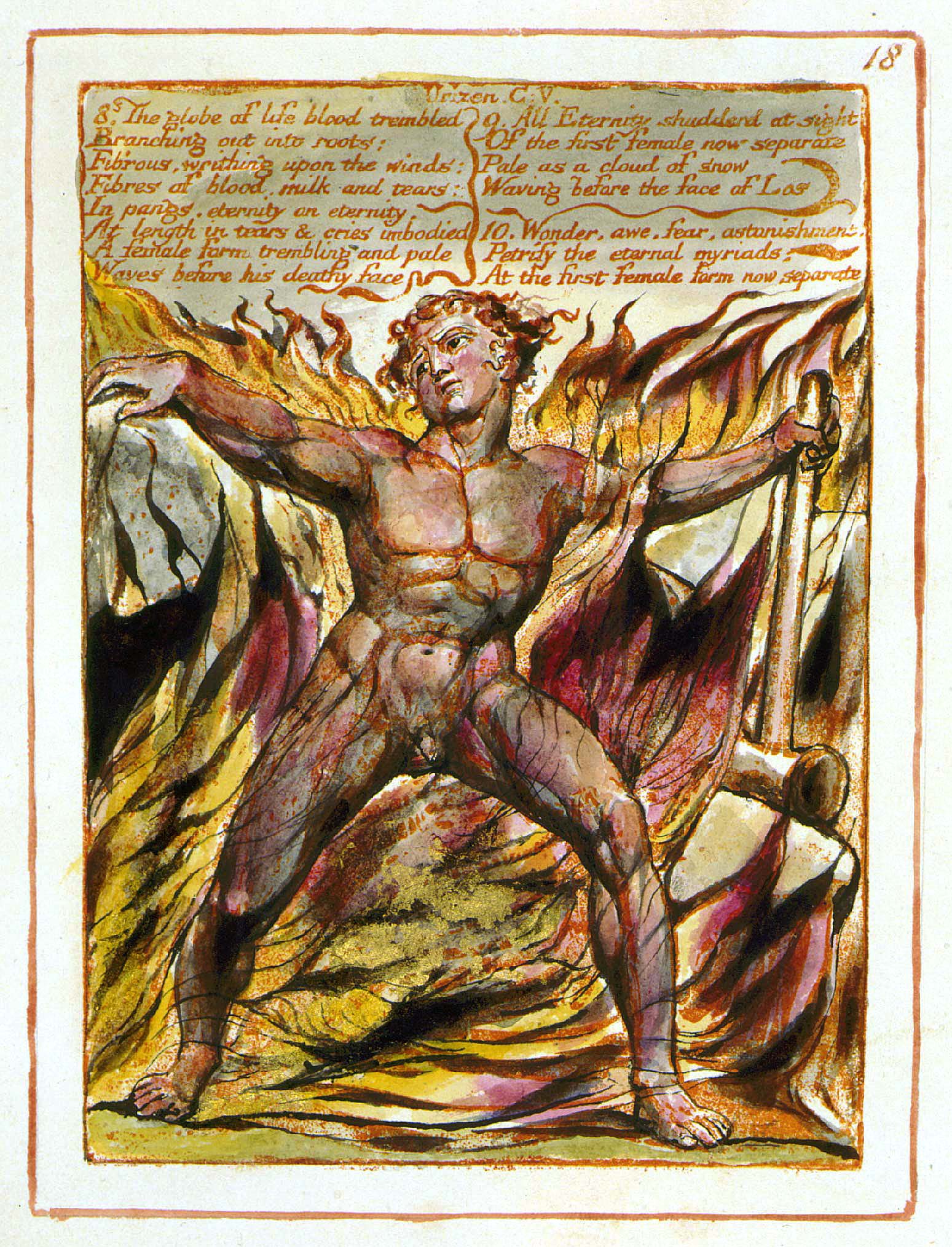|
Luvah
In the mythological writings of William Blake, Luvah is one of the four Zoas, who were created when Albion, the primordial man, was divided fourfold. He represents love, passion, and rebellious energy. His Emanation (female counterpart) is Vala; his fallen form is Orc. Throughout Blake's mythological system, he is opposed to Urizen, the representation of reason. He is also connected to Jesus, who takes upon his form as the being of love after Luvah falls and turns to a being of hate. Character Luvah represents a generative aspect that is connected to experience. In Blake's system, Luvah, the third Zoa, represents emotion as the Prince of Love, and his name may be connected to the word "lover". Love is the supreme emotion, and it is connected to all others, including hate. Luvah is connected to the heart. He is connected to Jesus, and the Incarnation is the result of Luvah transforming into hate; Jesus replaced Luvah's physical form after Luvah descended from his position. As such ... [...More Info...] [...Related Items...] OR: [Wikipedia] [Google] [Baidu] |
Urizen
In the mythology of William Blake, Urizen () is the embodiment of conventional reason and law. He is usually depicted as a bearded old man; he sometimes bears architect's tools, to create and constrain the universe; or nets, with which he ensnares people in webs of law and conventional society. Originally, Urizen represented one half of a two-part system, with him representing reason and Los, his opposition, representing imagination. In Blake's reworking of his mythic system, Urizen is one of the four ''Zoas'' that result from the division of the primordial man, Albion, and he continues to represent reason. He has an Emanation, or paired female equivalent, Ahania, who stands for Pleasure. In Blake's myth, Urizen is joined by many daughters with three representing aspects of the body. He is also joined by many sons, with four representing the four elements. These sons join in rebellion against their father but are later united in the Last Judgment. In many of Blake's books, Urize ... [...More Info...] [...Related Items...] OR: [Wikipedia] [Google] [Baidu] |
The Four Zoas
''Vala, or The Four Zoas'' is one of the uncompleted prophetic books by the English poet William Blake, begun in 1797. The eponymous main characters of the book are the Four Zoas (Urthona, Urizen, Luvah and Tharmas), who were created by the fall of Albion in Blake's mythology. It consists of nine books, referred to as "nights". These outline the interactions of the Zoas, their fallen forms and their Emanations. Blake intended the book to be a summation of his mythic universe but, dissatisfied, he abandoned the effort in 1807, leaving the poem in a rough draft and its engraving unfinished. The text of the poem was first published, with only a small portion of the accompanying illustrations, in 1893, by the Irish poet W. B. Yeats and his collaborator, the English writer and poet Edwin John Ellis, in their three-volume book '' The Works of William Blake''. Background Blake began working on ''Vala, or The Death and Judgement of the Eternal Man: A Dream of Nine Nights'' while he wa ... [...More Info...] [...Related Items...] OR: [Wikipedia] [Google] [Baidu] |
Vala, Or The Four Zoas
''Vala, or The Four Zoas'' is one of the uncompleted prophetic books by the English poet William Blake, begun in 1797. The eponymous main characters of the book are the Four Zoas (Urthona, Urizen, Luvah and Tharmas), who were created by the fall of Albion in Blake's mythology. It consists of nine books, referred to as "nights". These outline the interactions of the Zoas, their fallen forms and their Emanations. Blake intended the book to be a summation of his mythic universe but, dissatisfied, he abandoned the effort in 1807, leaving the poem in a rough draft and its engraving unfinished. The text of the poem was first published, with only a small portion of the accompanying illustrations, in 1893, by the Irish poet W. B. Yeats and his collaborator, the English writer and poet Edwin John Ellis, in their three-volume book '' The Works of William Blake''. Background Blake began working on ''Vala, or The Death and Judgement of the Eternal Man: A Dream of Nine Nights'' while he wa ... [...More Info...] [...Related Items...] OR: [Wikipedia] [Google] [Baidu] |
Orc (Blake)
Orc is a proper name for one of the characters in the complex mythology of William Blake. A fallen figure, Orc is the embodiment of rebellion, and stands opposed to Urizen, the embodiment of tradition. In Blake's illuminated book ''America a Prophecy'', Orc is described by his mythic opponent, "Albion's Angel" as the "Lover of Wild Rebellion, and transgressor of God's Law". He symbolizes the spirit of rebellion and freedom, which provoked the French Revolution. Background The name Orc is possibly an anagram of the word ''cor'' (heart), in that he was stated in Blake's myth to be born of Enitharmon's heart, or ''orca'' (whale) because he sometimes takes the form of a whale. Orcus is also the Latin word for Hell, and Orc is presented as a rebellious, Luciferian character. He was created to serve as Blake's analysis of the revolutions in the United States and France. Character In Blake's myth, Orc is seen as the first child of Los with Enitharmon and sometimes either replaced in ... [...More Info...] [...Related Items...] OR: [Wikipedia] [Google] [Baidu] |
William Blake's Mythology
The prophetic books of the English poet and artist William Blake contain an invented mythology, in which Blake worked to encode his spiritual and political ideas into a prophecy for a new age. This desire to recreate the cosmos is the heart of his work and his psychology. His myths often described the struggle between enlightenment and free love on the one hand, and restrictive education and morals on the other. Sources Among Blake's inspirations were John Milton's ''Paradise Lost'' and ''Paradise Regained'', the visions of Emanuel Swedenborg and the near-cabalistic writings of Jakob Böhme. Blake also included his own interpretations of druidism and paganism. The Fall of Albion The longest elaboration of this private myth-cycle was also his longest poem, '' The Four Zoas: The Death and Judgment of Albion The Ancient Man'', written in the late 1790s but left in manuscript form at the time of his death. In this work, Blake traces the fall of Albion, who was "originally fourfold b ... [...More Info...] [...Related Items...] OR: [Wikipedia] [Google] [Baidu] |
Albion (Blake)
In the William Blake's mythology, mythology of William Blake, Albion is the primeval man whose fall and division results in the Four Zoas: Urizen, Tharmas, Luvah/Orc (Blake), Orc and Urthona/Los (Blake), Los. The name derives from the ancient and mythological name of Britain, Albion. Sources In the mythical story of the founding of Prehistoric Britain, Britain, Alebion, Albion was a Gigantes, Giant son of Poseidon, the Greek mythology, Greek god of the sea. He was a contemporary of Heracles, who killed him. Albion founded a country on the island and ruled there. Britain, then called Albion after its founder, was inhabited by his Giant descendants until about 1100 years before Julius Cæsar's invasion of Britain, when Brutus of Troy came and defeated the small number of Giants that remained (as a group of the Giants had killed all the others). According to another account, Noah's son Japhet had a son named Histion, who had four sons. Their names were France, Francus, Rome, Romanus ... [...More Info...] [...Related Items...] OR: [Wikipedia] [Google] [Baidu] |
William Blake
William Blake (28 November 1757 – 12 August 1827) was an English poet, painter, and printmaker. Largely unrecognised during his life, Blake is now considered a seminal figure in the history of the poetry and visual art of the Romantic Age. What he called his " prophetic works" were said by 20th-century critic Northrop Frye to form "what is in proportion to its merits the least read body of poetry in the English language". His visual artistry led 21st-century critic Jonathan Jones to proclaim him "far and away the greatest artist Britain has ever produced". In 2002, Blake was placed at number 38 in the BBC's poll of the 100 Greatest Britons. While he lived in London his entire life, except for three years spent in Felpham, he produced a diverse and symbolically rich collection of works, which embraced the imagination as "the body of God" or "human existence itself". Although Blake was considered mad by contemporaries for his idiosyncratic views, he is held in high regard b ... [...More Info...] [...Related Items...] OR: [Wikipedia] [Google] [Baidu] |
Enitharmon
Enitharmon is a major female character in William Blake's mythology, playing a main part in some of his prophetic books. She is, but not directly, an aspect of the male Urthona, one of the Four Zoas. She is in fact the Emanation of Los, also male. There is a complex verbal nexus attached. The Zoa Tharmas has emanation Enion, and Eni-tharm(as)-on is one derivation of her name. That should perhaps be read in the inverse direction though, as a construction of the Tharmas/Enion pair's names. Within Blake's myth, she represents female domination and sexual restraints that limit the artistic imagination. She, with Los, gives birth to various children, including Orc. Background It is possible that the character Enitharmon was based on Blake's wife, Catherine Blake. In a letter from Blake to his friend Thomas Butts, Jr. on 22 November 1802, he claimed that his place at Surrey had "Enitharmon's bower". S. Foster Damon explained the name Enitharmon as a derivation or an elision of (z)enit ... [...More Info...] [...Related Items...] OR: [Wikipedia] [Google] [Baidu] |
Los (Blake)
In the mythological writings of William Blake, Los is the fallen (earthly or human) form of Urthona, one of the four Zoas. He is referred to as the "eternal prophet" and creates the visionary city of Golgonooza. Los is regularly described as a smith, beating with his hammer on a forge, which is metaphorically connected to the beating of the human heart. The bellows of his forge are the human lungs. Los's emanation, Enitharmon, represents spiritual beauty and embodies pity, but at the same time creates the spatial aspect of the fallen world, weaving bodies for men and creating sexual strife through her insistence upon chastity. In the ''Book of Urizen'' (1794), Los and Enitharmon have a child, Orc, who is the embodiment of the spirit of revolution. The name ''Los'' is, by common critical acceptance, an anagram of '' Sol'', the Latin word for "sun". ''Los'' is also the plural form of ''El'', an ancient Hebrew deity. Such innovations are common in many of Blake's prophetic poems. B ... [...More Info...] [...Related Items...] OR: [Wikipedia] [Google] [Baidu] |
Zoas
In the mythology of William Blake, Albion is the primeval man whose fall and division results in the Four Zoas: Urizen, Tharmas, Luvah/Orc and Urthona/Los. The name derives from the ancient and mythological name of Britain, Albion. Sources In the mythical story of the founding of Britain, Albion was a Giant son of Poseidon, the Greek god of the sea. He was a contemporary of Heracles, who killed him. Albion founded a country on the island and ruled there. Britain, then called Albion after its founder, was inhabited by his Giant descendants until about 1100 years before Julius Cæsar's invasion of Britain, when Brutus of Troy came and defeated the small number of Giants that remained (as a group of the Giants had killed all the others). According to another account, Noah's son Japhet had a son named Histion, who had four sons. Their names were Francus, Romanus, Brittos and Alemannus, and the French, Roman, British and German people are descended from them. Brittos divided Brit ... [...More Info...] [...Related Items...] OR: [Wikipedia] [Google] [Baidu] |
Jerusalem The Emanation Of The Giant Albion
''Jerusalem'', subtitled ''The Emanation of the Giant Albion'' (1804–1820, with additions made even later), is the last, longest and greatest in scope of the prophetic books written and illustrated by the English poet, artist and engraver William Blake. Etched in handwriting, accompanied by small sketches, marginal figures and huge full-plate illustrations, it has been described as "visionary theatre". The poet himself believed it was his masterpiece and it has been said that "of all Blake's illuminated epics, this is by far the most public and accessible". Nonetheless, only six copies were printed in Blake's lifetime and the book, like all of Blake's prophetic works, was all but ignored by his contemporaries. The lyric to the famous hymn ''Jerusalem'' (text also by Blake, with music by Sir Hubert Parry) is not connected to this poem. It is in fact taken from the preface to another of Blake's "prophetic books", ''Milton''. Production technique The poem, which was produced be ... [...More Info...] [...Related Items...] OR: [Wikipedia] [Google] [Baidu] |
Vala (Blake)
Vala or VALA may refer to: Religion and mythology * Vala (Vedic), a demon or a stone cavern in the Hindu scriptures * Völva, also spelled Vala, a priestess in Norse mythology and Norse paganism Fiction * Vala (Middle-earth), an angelic being in J. R. R. Tolkien's fiction * Vala Mal Doran, a fictional character in the Canadian-American television series ''Stargate SG-1'' * Vala (Blake), a character in the mythological writings of William Blake * ''Vala, or The Four Zoas'', a poem by Blake People * Vala (clan), a Rajput clan found in Gujarat in India Surname * Aleš Vála (born 1973), a Czech ice hockey player * Asad Vala (born 1987), a Papua New Guinean cricketer * Jessie Rose Vala (born 1977), an American artist * Jorge Vala (born 1984), a Portuguese academic * Katri Vala (1901–1944), a Finnish poet * Lobat Vala (born 1930), an Iranian poet and activist * Numonius Vala, a Roman family name, or any of the men of that name * Vajubhai Vala, an Indian politician Given name * V ... [...More Info...] [...Related Items...] OR: [Wikipedia] [Google] [Baidu] |









